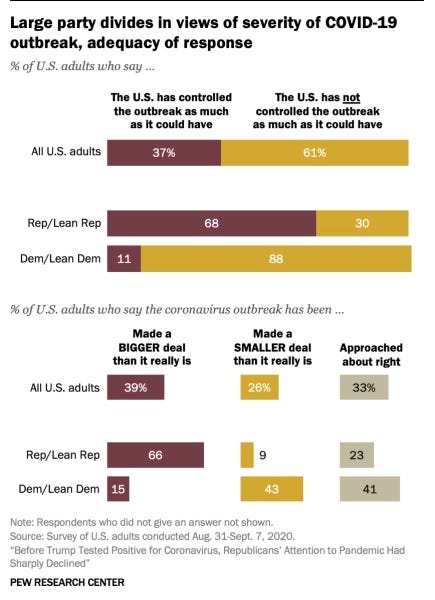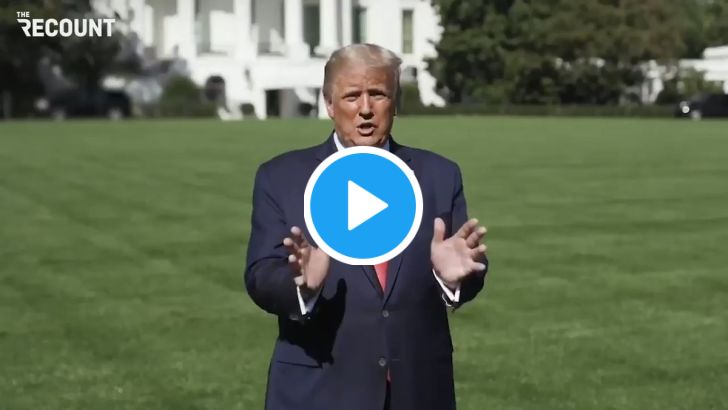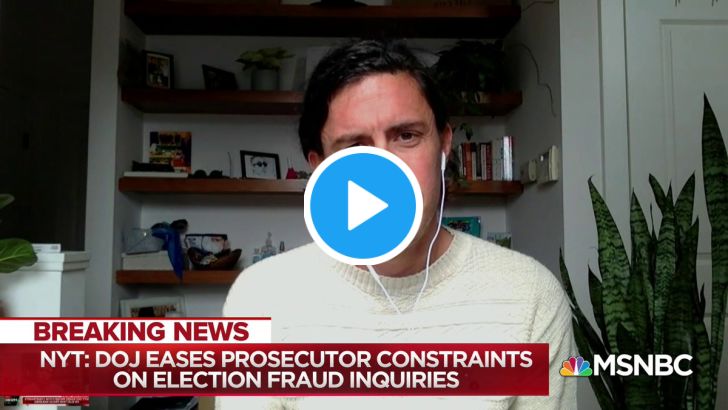
It’s easy to get lost in the thicket of Donald Trump’s kaleidoscopic awfulness.
So this compilation is handy: “A Catalog of Trump’s Worst Cruelties, Collusions, Corruptions, and Crimes.” You should bookmark it. Or you could just follow his Twitter feed over the last 36 hours.
In a remotely normal presidency, an incumbent would be making his well-honed final argument; emphasizing his successes, drawing an alluring picture of the next four years, and reaching out to swing voters.
Instead, Trump has saved the worst for last.
Welcome to the Countdown Journal. There are 25 days to go until Election Day, and then 78 days until the Inauguration.
With a little more than three weeks to go, Trump continues to mislead the country about the dangers of the coronavirus; actively plans to take his super-spreader campaign on the road; refuses to commit to accepting the election results; pushes an insane conspiracy theory; and calls for his enemies — including Joe Biden — to be indicted.
Yesterday morning, the president phoned into Maria Bartiromo’s show to call Kamala Harris a “monster,” and a “communist,” and demand that his political opponents be criminally charged. He even lashed out at his closest allies in his own government.
“Unless Bill Barr indicts these people for crimes — the greatest political crime in the history of our country — then we’re going to get little satisfaction, unless I win,” Trump said, adding that he “won’t forget it” and that the crime “includes Obama, and that includes Biden.”
Trump also said at another point that “Bill has got to move” and that he would go down in history as a “very sad situation” if he doesn’t indict people.
That was the mellow part of his day.
In a story that’s shocking even by 2020 standards, authorities announced that they had thwarted a plan to kidnap and possibly murder Michigan Governor Gretchen Whitmer, a frequent target of Trump’s verbal attacks. Did Attorney General Bill Barr know about the plot? "If he didn't, he's incompetent,“ Whitmer said on CNN last night. “The fact of the matter is, I have raised this very issue with this White House and asked them to bring the heat down .… I asked for their help and they didn't do a darn thing."
While the motives of the men indicted in the plot may be mixed, the plot was foreshadowed on social media.
There’s the Twitter account that apparently belongs to another suspect, Barry Croft, ranting about immigrants, praising President Trump and calling for the prosecution of Trump’s onetime Democratic rival, Hillary Clinton. One image featured by the account shows a young man draped in ammunition and cradling a rifle in his hands.
And then there was a Facebook page called “Michigan Militia Corps, Wolverines” that, until it was taken down in recent weeks, enlisted similar rhetoric as the group behind the plot, which authorities identified as “Wolverine Watchmen.” In a May post linking to an article headlined, “Trump sides with protesters against Michigan governor,” there is an accompanying image of men holding massive firearms.
The revelations underline the warnings from former Department of Homeland Security official Elizabeth Neumann, who charged that Trump’s “divisive language is indirectly tied to attacks we’ve seen in the last two years.”
In an interview, Neumann pointed out that at a minimum, Trump should entertain the possibility that his language is inciting such rage and learn from it.
“The timing is tied to when the president encouraged the people of Michigan to take matters into their own hands,” Neumann told me. “His rhetoric matters.”
Neumann noted that this kind of rhetoric risks drawing from the ranks of people who might be right-wing extremists but not inclined to violence, and inflating the numbers who might be willing to take that next step.
You can listen to her here:
Whitmer herself pointed the finger directly at Trump:
She singled out Trump’s debate comments, when he didn’t condemn white supremacist groups and told one far-right extremist group to “stand back and stand by.”
“Hate groups heard the president’s words not as a rebuke, but as a rallying cry,” Whitmer said. “When our leaders speak, their words matter. They carry weight. When our leaders meet, encourage or fraternize with domestic terrorists, they legitimize their actions and they are complicit. When they stoke and contribute to hate speech, they are complicit.”
How did Trump respond.? First by sending out a weasel-faced surrogate to attack Whitmer, and then by lashing out himself.
Saving his worst for last.
Speaking of super-spreaders. Make sure you read this story: “Guests at Trump’s events scattered across the country. Potentially exposed, many of their contacts may never be identified.”
With no systematic effort to trace or advise the hundreds of guests at the Rose Garden ceremony and other events in the surrounding days, many made their way home and resumed their busy schedules, according to interviews with more than 40 people who attended events with the president between Sept. 25 and Oct. 1, when Trump announced he had tested positive.
Experts said the fallout, driven largely by individuals forced to make their own choices without clear instructions from a central authority, is emblematic of the nation’s response to the pandemic and helps explain why the virus remains uncontained nearly 10 months after it first arrived in the United States. The infection of Trump and those around him was, even more starkly, a window into an attitude of invulnerability and indifference that surrounds the president.
Mitch distances. It’s not much, but McConnell’s comments are a rare rebuke to the president.
"I actually haven't been to the White House since Aug. 6, because my impression was their approach to how to handle this was different from mine and what I insisted that we do in the Senate, which is to wear a mask and practice social distancing," the 78-year-old lawmaker said.
His remarks drew a sharp contrast with Trump, who was hospitalized for three days with the coronavirus but publicly removed his mask in front of TV cameras after returning to the White House.
Who’s Vulnerable?
The best words. "You're not vulnerable, but they like to say the vulnerable, but you're the least vulnerable — but for this one thing you are vulnerable."
Why is Trump losing seniors so badly? Here’s a deep-drive into the question.
What happened? Part of the reason is the coronavirus pandemic, a disruption that has left seniors uniquely vulnerable, and isolated and without any clear plan to bring them back safely into society.
But to Nora Super, the senior director of the Milken Institute’s Center for the Future of Aging, it goes well beyond that.
A deal? What could go wrong?
Flashback from The Art of the Deal: "The worst thing you can possibly do in a deal is seem desperate to make it. That makes the other guy smell blood, and then you're dead."
Alternative Realities. You know this, but the numbers from Pew are still sobering: we live in two separate Americas.
Overall, 61% of adults say the U.S. has not controlled the COVID-19 outbreak as much as it could have, compared with 37% who say it has. Inside those numbers is a stark partisan divide: About two-thirds of Republicans and independents who lean Republican (68%) say the U.S. has done about as much as it could in controlling the outbreak. That view is held by only about one-in-ten Democrats, including independents who lean Democratic (11%).

Media consumption explains much of the divide:
Fully 90% of those Republicans who only indicated Fox News and/or talk radio – two platforms with conservative-leaning audiences – as major sources of political news say the country has controlled the outbreak as much as it could. But among Republicans who rely on neither Fox News nor talk radio but rely on at least one of the other major news providers mentioned in the survey, about half as many (46%) say the U.S. controlled the outbreak as well as it could.
A cure for bed wetting? Check out this new Pew poll, which has Biden up by 10 points.
With less than a month to go before the election, a majority of registered voters (57%) say they are very or somewhat confident in Biden to handle the public health impact of the coronavirus, while 40% express a similar level of confidence in Trump. In June, Biden held a narrower, 11 percentage point lead on handling the coronavirus outbreak (52% Biden, 41% Trump).
The FiveThirtyEight average has Biden up by 9.8 points; RealClearPolitics has his lead at 9.7 points; NYT average, Biden up by 10.
You also might want to read James Carville here: “Democrats need to start planning for a Biden White House.”
There are 25 days to go.
Quick Hits
1. Get Ready For The Second Wave
Brent Orell in today’s Bulwark:
Dr. Anthony Fauci said in early August that we need to be at around 10,000 new infections daily by September or “we’re going to have a really bad situation in the fall”—but now, in mid-October, we are at around four times that number and racking up over 700 deaths per day. New York state has reached 1,000 infections per day for the first time since June. Boston just announced a pause in its school opening as positive COVID test rates jumped to 4 percent. Smaller states, like North Dakota, are already struggling to find enough ICU beds to care for critically ill patients.
2. The Big Supreme Court Cases to Watch for This Fall
Kim Wehle in this morning’s Bulwark:
The blockbuster case this fall is Texas v. California, which is scheduled for oral argument the week after the Nov. 3 election that will decide the political fate of the man who nominated Judge Barrett. The case is the second challenge to the Affordable Care Act (ACA) to reach the high court. In 2012, the Court decided American Federation of Independent Business v. Sebelius, which salvaged the ACA from constitutional demise on the theory that the so-called individual mandate—the part of the law that requires Americans to carry a certain level of health insurance or pay a penalty—was a tax and thus constitutional.
Cheap Shots
Deep Thoughts
1. Trump is the Wizard of Oz—Only Nuts
Richard North Patterson in the Bulwark:
Anxious Democrats imagine Donald Trump as a political Houdini—a genius at escaping the most dire political straits. Somehow, they fear, he will summon serial October surprises beyond the capacity of lesser mortals.
Rubbish.
In truth, Trump is America’s ersatz Wizard of Oz—a one-trick faux populist with deep but finite appeal who, in 2016, filled the mother of inside straights. By 2018, he had squandered his winnings. In 2020, he’s become the little man behind the curtain, brutally exposed by his own incompetence and instability.
Forget the first three-and-two-third years of self-aggrandizing incompetence. Just take the last three weeks—during which Trump has demonstrated the survival instincts of Jim Jones in his final hour at Jonestown. He is committing electoral suicide, and taking his party with him.









